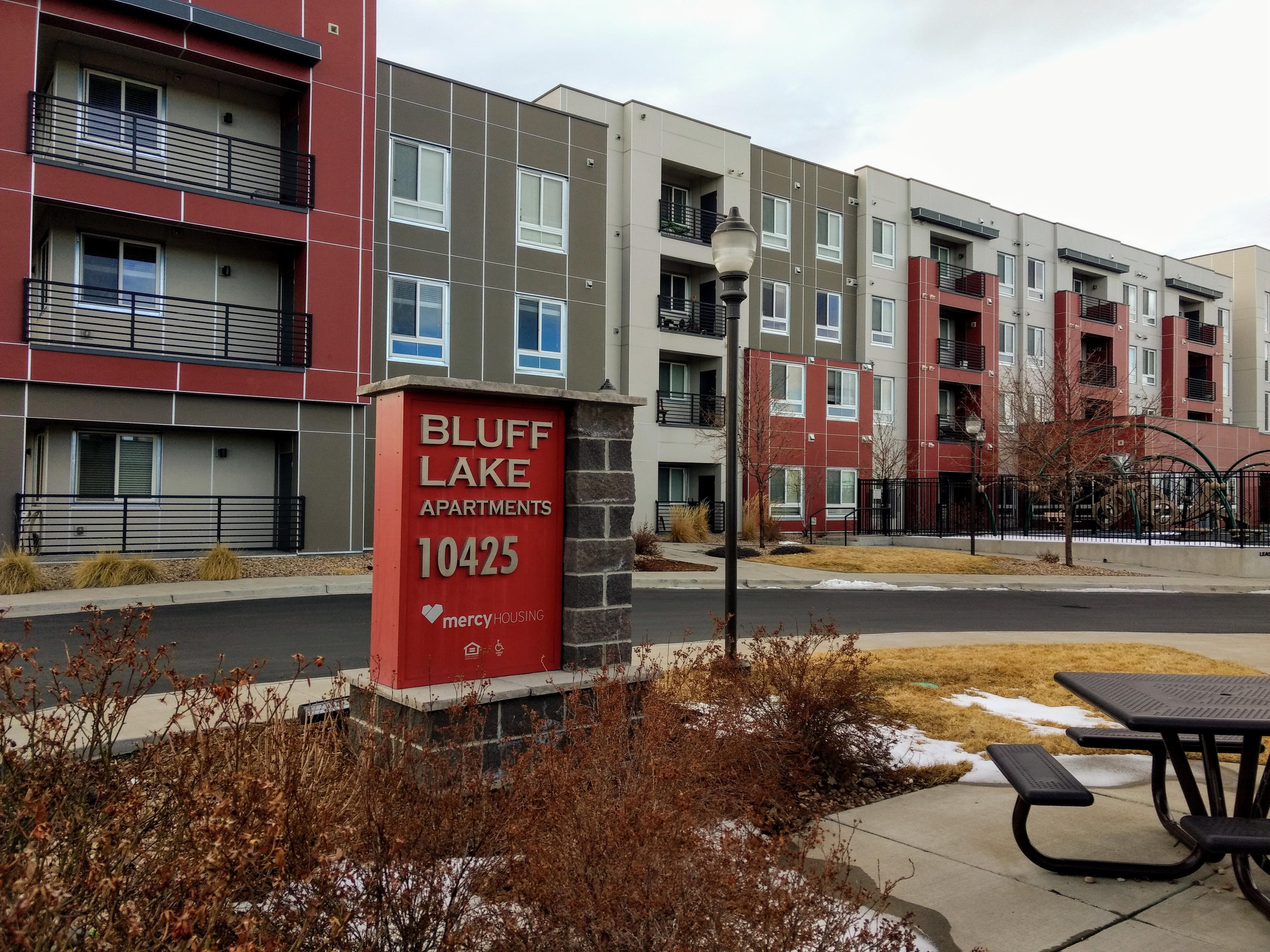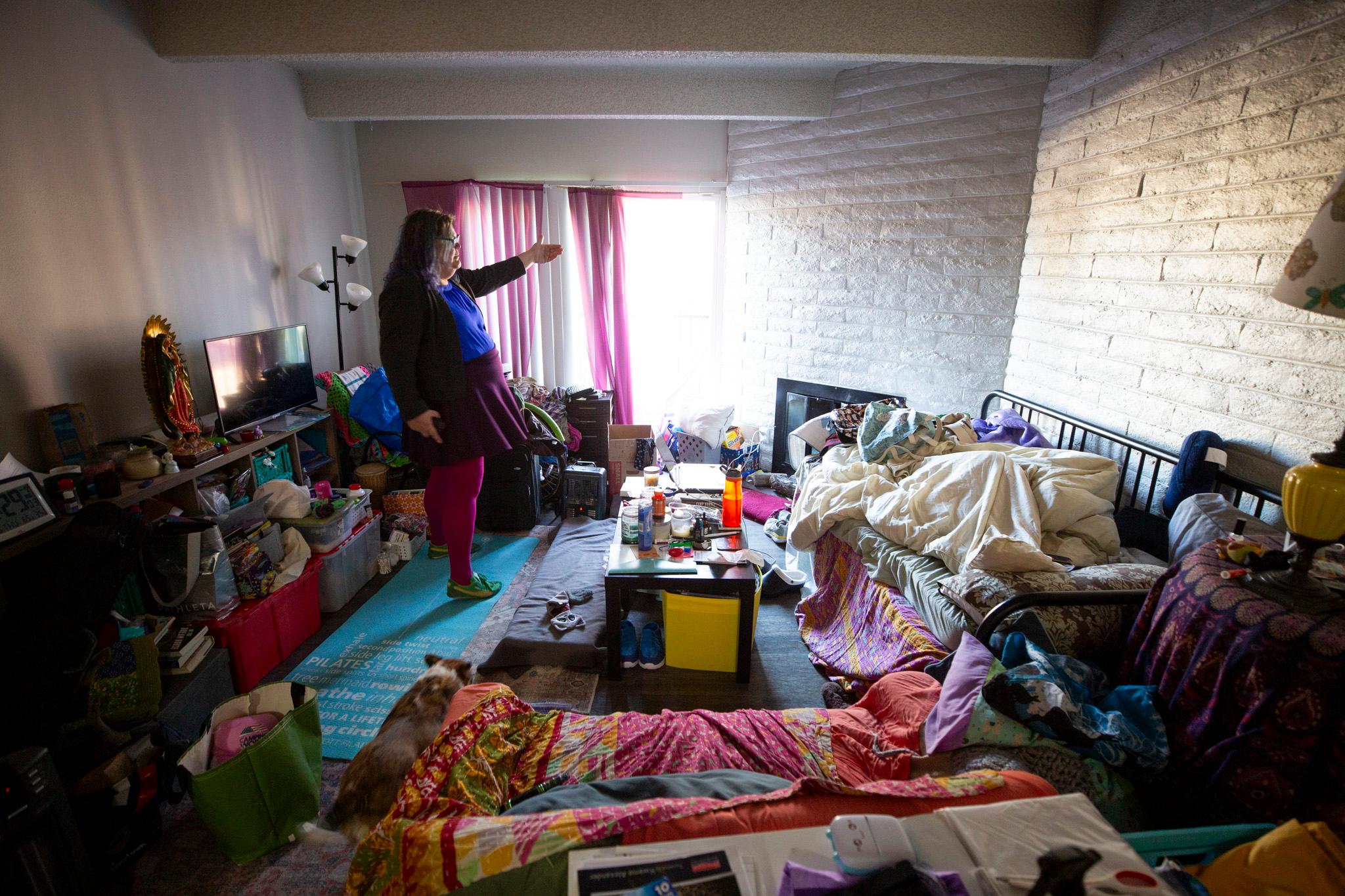One of the largest nonprofit developers and managers of affordable housing in the country has hired a new staffer to build more in its backyard -- the Denver area.
Mercy Housing, which moved to Denver soon after a nun founded it in Nebraska in 1981, owns more than 300 properties that are home to more than 40,000 people in 41 states. Kuhl Brown recently joined the 180 people working at the downtown Denver high-rise that houses Mercy's national headquarters. As regional director of real estate development for Mercy, Brown said he will be focusing on the Front Range and Denver in particular, "newly engaging this market again after a slight time off."
Mercy hasn't had a developer in Denver since staff was trimmed for economic reasons about six years ago, Brown said. His post comes as other new players and additional money enter the Denver affordable housing scene and awareness of the crisis grows. Jennifer Reed, Mercy's Denver-based regional director of philanthropy, said that when she talks about affordable housing these days "I'm definitely getting fewer blank stares."
Longtime affordable housing advocate Heather Lafferty also sees a shift.
"Everybody's paying attention -- employers are paying attention, parents of millennials are paying attention," said Lafferty, who is CEO and executive director Habitat for Humanity of Metro Denver, a nonprofit known for its model of bringing down the cost of building by using the labor of volunteers and prospective homeowners.
Habitat, which is also a mortgage lender, has been working in the Denver area for 40 years. It has recently been bringing new ideas to the affordable housing conversation, among them a focus on prefab construction techniques.
Among the new sources of funds for affordable housing in Denver is New York-based Community Development Trust, which over the last 20 years has invested in properties in 44 states to help to preserve and create more than 45,000 affordable housing units. In December the company announced its first investment in Denver, a $25 million joint venture with Rocky Mountain Communities, a Colorado affordable housing developer, to recapitalize the Garden Court Apartments, a complex of 300 units -- 225 reserved for moderate-, low- and very low-income families -- in northeast Denver. An agreement keeping rents low at the 47-year-old complex was set to expire in 2023. Under the deal announced in December, one of Denver's largest housing developments will continue to rent apartments at affordable rates through 2033 as part of a new agreement with the Colorado Housing and Finance Authority.
Community Development Trust recently hired a Denver-based staffer, said the company's Chief Investment Officer Brian Dowling. Dowling sees potential in more partnerships with the Colorado Housing and Finance Authority. Denver city officials have made affordable housing a priority, Dowling said, calling their stance "a very strong commitment that we think will be a longstanding commitment."
In 2016, the Denver City Council approved an affordable housing fund that was established the next year from property tax revenue and a one-time development fee. The goal is to use such tools as buying land on which affordable housing can be built and offering tax credits to developers to increase the supply of for-sale and rental units for low- and moderate-income Denverites and to provide renter and buyer assistance programs. At its creation it was estimated the fund, administered by the city's Office of Economic Development, would raise $150 million over 10 years to create or preserve 6,000 affordable homes. The 2019 city budget accelerated that by including more than $50 million to create or preserve those 6,000 units over the next five years, thanks to an infusion of marijuana tax money.
A population boom has wiped out a housing surplus Colorado once had. With demand outstripping supply, rents and for-sale prices have risen quickly even as wages have stagnated for many people. In its latest annual report on the city's progress on housing, the Office of Economic Development noted the median rent in Denver increased 74 percent over the last decade, to $1,406 at the end of the first quarter of 2018. For home sales, according to the real estate company RE/MAX, prices have risen more than 40 percent since 2012, to an average median price of $401,550 last year.
According to Federal Reserve figures, the median household income in Denver rose about 60 percent between 2000 and 2017, to about $65,000. A report last year released by the nonprofit Colorado Center on Law and Policy found that nearly 30 percent of Denver households needed to augment their earnings with public or private assistance to cover the basics -- housing, food, childcare, transportation, taxes. Teachers and firefighters are among those who find housing in Denver out of reach on their own.
"The most important thing is that wages haven't kept up," said Stefka Fanchi, a former Habitat staffer who now leads Elevation Community Land Trust.
Elevation promotes the model in which the land under a group of homes is owned communally and never sold, which helps slow appreciation. Another nonprofit, Colorado Community Land Trust, has been working in this area for years. The arrival of Elevation opens one more new front in the fight for affordable housing.
"We've had an affordable housing crisis for many years," Fanchi said. "But now it's come to the forefront."
The number of Denver households who pay more than 30 percent of their gross income for housing -- the U.S. Department of Housing and Urban Development's definition of "cost burdened" -- is one data point the city uses to describe its housing crisis. In 2016 that was more 110,000 Denver households -- a third of all households, according to the Office of Economic Development report. The affordable housing fund can only do so much to bring down prices by increasing supply.
Since taking over in June as chief housing officer for the Denver Office of Economic Development, Britta Fisher said she has seen growing public awareness not only of the housing crisis but of resources to address it. Fisher said the city is happy to partner with organizations like Mercy, which she said was committed to building vibrant communities.

Sister Timothy Marie O'Roark saw the plight of families facing eviction when she worked as a legal aid attorney in Omaha, Nebraska. She turned to her order, the Sisters of Mercy in Omaha, with the idea of affordable housing as a ministry. Mercy Housing was incorporated as a Nebraska nonprofit in 1981 and, working with experts from private real estate grew quickly, moving to Denver because it was more centrally located and had better flight connections. In 1983, Mercy Housing created a property management subsidiary and a development loan fund.
An Illinois order, the Wheaton Franciscan Sisters, asked Mercy Housing to take over its affordable housing network in 10 states in 2015. The subsequent transfer of 33 Franciscan properties was both a sudden increase in Mercy's size and reach and a reminder of a reality Mercy also has had to face -- the declining numbers of women taking on a religious life. Mercy had addressed that the year before when it for the first time in its history named a CEO who was not a nun, Jane Graf. Graf, who had worked for Mercy for decades before taking the top post, is still CEO. Her board of directors includes nuns from several orders.
Brown, Graf's new hire in Denver, has developed affordable housing for the Colorado Coalition for the Homeless and for Mercy in San Francisco -- a city known even more than Denver as the epicenter of a housing crisis.
From Mercy's Denver offices, Brown has already responded to a call for proposals for sites the city bought along East Colfax. The Office of Economic Development envisions mixed-use developments that include businesses and affordable rental housing and permanent supportive housing for people who have experienced homelessness. Mercy's proposal includes an early childhood center, Brown said.
Mercy is known for the support it provides at its housing units, from after-school snacks for children to job training for their parents. Help is offered in the spirit of Mercy's founders, said Jennifer Thibault, Mercy's regional vice president for operations.
"Respect, justice and mercy for everyone is at our core," Thibault said.

Mercy has a dozen properties in metropolitan Denver. The most recent to be completed, in 2012, is Bluff Lake Apartments, 92 units for families earning between 30 and 50 percent of the area median income located near shopping, a rec center and walking trails in Stapleton. Thibault said in the planning stages for Bluff Lake, Mercy set a goal of ensuring 20 percent of the residents gained housing. It turned out "folks are already employed," she said. As the housing crises spread in recent years to working-class Denverites, Mercy's focus shifted to providing childcare and financial literacy and preparing people for better-paying jobs.
Brown said he is looking to bring ideas he's seen elsewhere, such as locating a social enterprise at a housing complex where residents can get on-the-job training. His portfolio includes finding ways to renovate some of Mercy's aging properties in the region.

Brown, like others in the field, is hearing more conversation around affordable housing. But words won't be enough to address the crisis as construction and land costs continue to rise. Brown is looking for partners such as churches that might have land to offer, and ways to put more units onto the lots he can find.
"Our challenge becomes doing more with less," he said.
Still, said Habitat's Lafferty, "this is definitely a moment. I've been working in housing for almost 20 years out of Denver and housing's never been a top-of-mind issue for conversation. Health and education and workforce development -- those have been the issues that tend to get people's attention."
It's becoming clearer that housing is intertwined with those concerns, Lafferty said. Children who can't be sure where they will sleep at night are less successful at school and therefore less prepared to contribute to the economy when they are older. Parents who are stressed about their bills are more prone to illness, affecting the productivity of today's workforce.
"It's unfortunate," Lafferty said, "that we had to get to the crisis level to create awareness."












